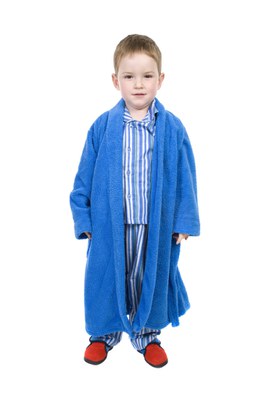Snooze News: The Importance of Healthy Sleep Habits (FS1943, Oct. 2019)
We can support our children emotionally, physically, academically and socially just by helping them establish healthy sleep habits.
Availability: Web only
(iStock.com)
Average Sleep Needs
www.sleepfoundation.org
How can you tell if your child is getting enough sleep?
- Falls asleep at night within 25- to 35-minutes
- Generally is in a positive mood throughout the day
- Wakes on own in the morning
Tips for Better Bedtimes
- Give young children their baths and read for at least 15 to 20 minutes sometime before the bedtime routine begins. This way, you can keep the actual bedtime routine to 20 minutes or less.
- Predictable bedtime routines are important. Routines can include a small healthful snack, brushing teeth, toileting, putting on pajamas, telling a story or singing a relaxing song while giving a gentle backrub.
- Allow children to fall asleep on their own.
- Young children like to do things in the same order. Write out your routine in words and pictures for everyone to follow.
- Check on young children briefly but frequently. This cuts down on children getting out of bed to see what the adults are doing. Children need to relax to fall asleep.
- The bedtime schedule should not vary more than an hour, even on weekends or special occasions.
- If you need to adjust the sleep schedule for bedtime (make it earlier, etc.), do so in increments by waking the child 15 minutes earlier each day and then going to bed earlier.
Signs of Sleep Issues
This list provides examples of behaviors we might see if a child is missing sleep or has sleep issues.
Emotional (Feelings)
- Easily overwhelmed; frustrated by little things
- Becomes more upset than peers by changes in routine
- More difficult to calm
- Irritable, whiny and difficult to satisfy; nothing seems right
- Anxious
Physical (Body)
- Clumsy, stumbles, more accidents and injuries
- Frenzied hyper-activity
- Gets a second wind at bedtime; can’t relax or fall asleep
- Hits, throws things or shouts
- Has to be awakened in the morning
- Sick more often than peers
- Craves carbohydrates or sugar
- Lethargic; sleepy, groggy
- Experiences stomachaches or headaches
Attention, Focus and Performance (Mental)
- Seeks stimulation – disrupts others or picks on people and pets
- Difficulty staying on task, making decisions
- Doesn’t listen, talks excessively
- Difficulty performing at a peak level or resists performing altogether
- Forgets easily
Social (Interactions)
- Feelings easily hurt
- Difficulty being patient
- Acts bossy, demanding
- Gets upset if told “no”
- Difficulty discussing conflict, solving age-appropriate problems
- Easily forgets the rules or wants to debate them
- Irritated by other children, especially in the afternoons
More Sleep News
- The timing of meals and naps impact a child’s sleep schedule.
- Sleeping is as important as food is to our bodies and brains.
- Many behaviors that frustrate parents and teachers are caused by lack of sleep.
(Reference: Kurcinka, M.S. (2006). Sleepless in America: Is Your Child Misbehaving or Missing Sleep? New York, N.Y.: HarperCollins.)


